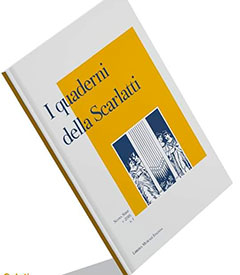 CHI SIAMO
CHI SIAMO
 ATTIVITA'
ATTIVITA'
 BANCHE DATI
BANCHE DATI
 NEWS & INFO
NEWS & INFO
- CIDIM
- Soci
- Comunicati e
Rassegna stampa - Vincitori di concorsi
- Selezioni e audizioni
- Prime assolute
- Dal vivo in Italia
- Dal vivo nel mondo
- Convegni / Incontri
- Festival e stagioni concertistiche in Italia
- Radio e televisione
- Nuove incisioni, DVD
- Libri e partiture
- Periodici
- Corsi
- Concorsi
- Musica in rete
- Formazione di base e di nuovo pubblico
- In Italia e dal mondo
- Festival e stagioni concertistiche nel mondo
 COMMUNITY
COMMUNITY
PUBBLICAZIONI
 Ricerche sulla musica
Ricerche sulla musica Da Agar a Giuditta: due storie bibliche per Alessandro Scarlatti di Dinko Fabris I Quaderni Associazione Alessandro Scarlatti ISBN 9788855430807 Collana: I Quaderni della Scarlatti - Nuova serie 2-2020, LIM Editrice srl, Lucca 2021 pp. 214 - 17×24, € 7,00 Shop Nomi oggetto della pubblicazione: Alessandro Scarlatti Descrizione: Both Agar et Ismaele esiliati and Giuditta, the earliest oratorios by Alessandro Scarlatti surviving with complete music sources, are based on female stories taken from the Bible. Agar was an esclave and lover of Abraham, chased away by his legitimal wife Sarah even though she had asked Agar to give her husband a child, Ishmael; Judith, on the other hand, was a rich Jewish widow who was turned into heroin for killing Holofernes. Especially the second character, Giuditta, had a great success in Italian and European music of the Baroque age from the seventeenth century to Mozart. Scarlatti set two oratorios on Judith story, one on a libretto by cardinal Pietro Ottoboni (Giuditta di Napoli), the other on a text of Ottoboni’s father, Antonio (Giuditta di Cambridge, following the titles assigned by the first scholar of Scarlatti’s oratorios, Lino Bianchi). Agar et Ismaele is considered today the first oratorio written by Scarlatti, according the only musical source surviving in Vienna, bearing the date 1683. This was a crucial year in Scarlatti’s biography and in the history of music, since the still young ‘Palermitano’ left Rome and started a successful career in Naples, invited by the Spanish viceroy Del Carpio. Ten years later, Scarlatti composed in Naples his first oratorio Giuditta (the date 1693 is based on a letter by the same composer sending the score to the librettist Ottoboni), for a performance in Rome. The comparison between the sources of Agar et Ismael and Giuditta (di Napoli) is very interesting, and also useful to trace the kind of influences Scarlatti received from the fervent Neapolitan musical environment during the first decade spent as the chapelmaster of the Viceroy. In particular, the subject of Giuditta was not new to Naples but on the contrary very popular in churches and chapels in the city also in the form of musical dramas performed before that of Scarlatti, starting from a drama never considered so far by the Neapolitan librettist Giulio Cesare Sorrentino. |






